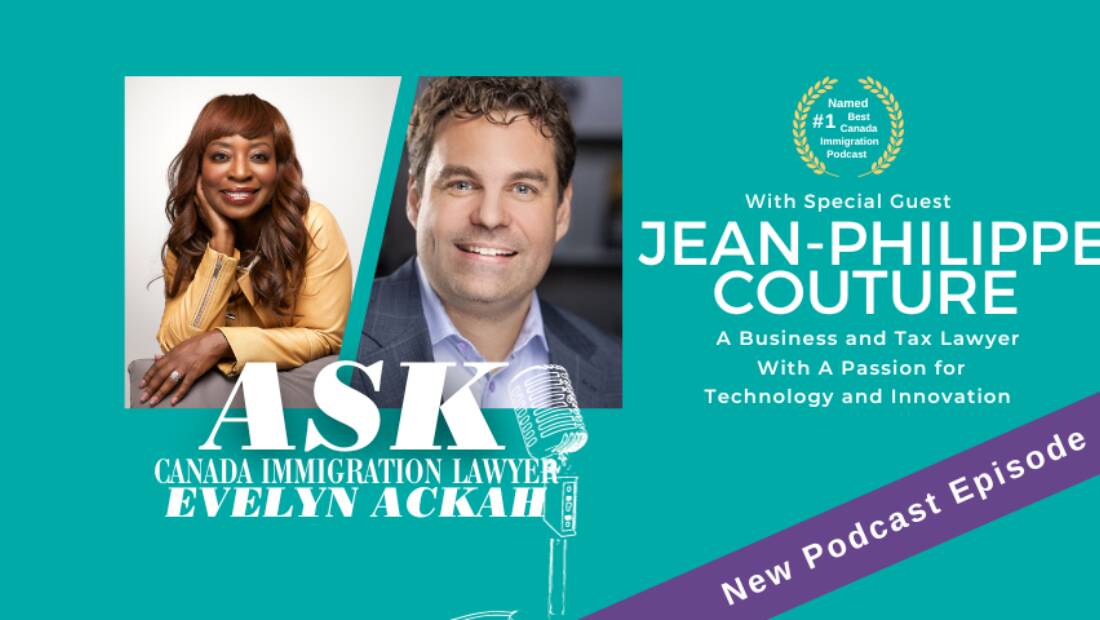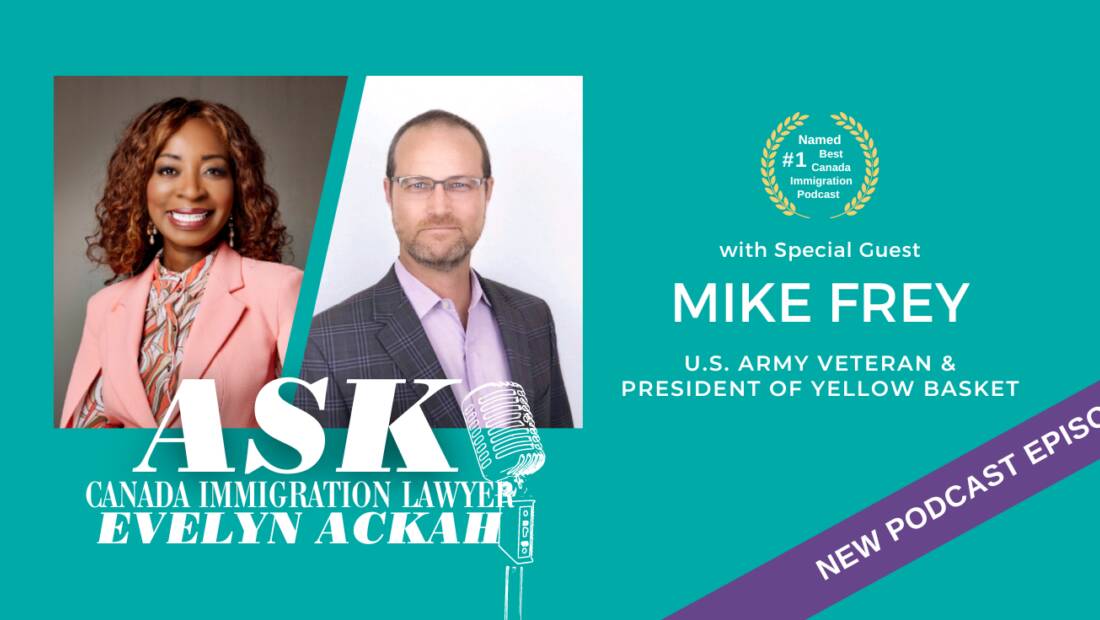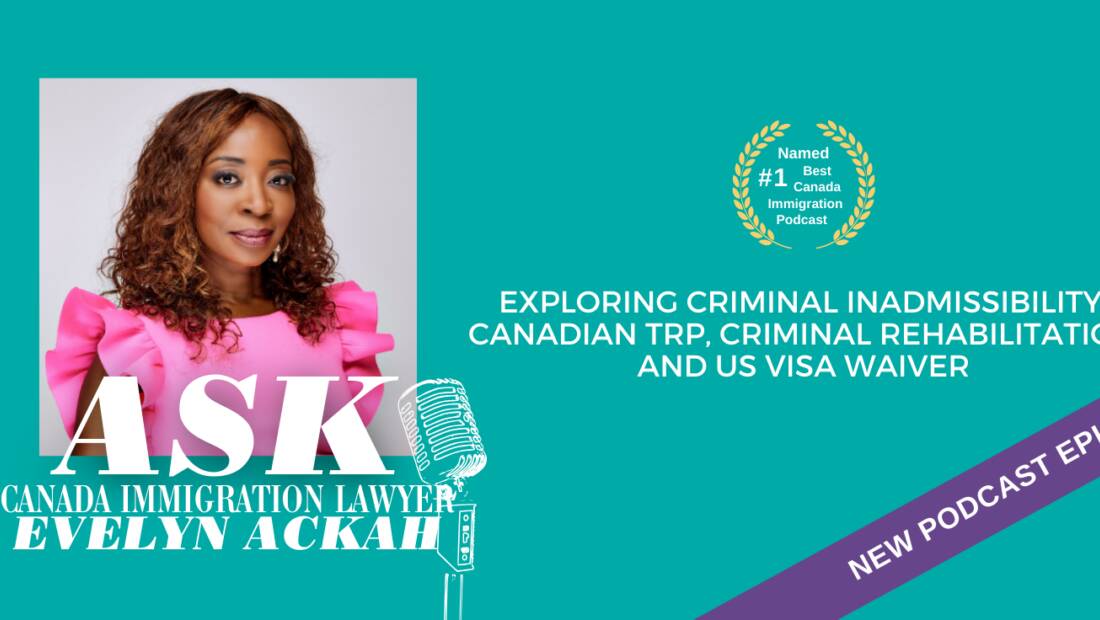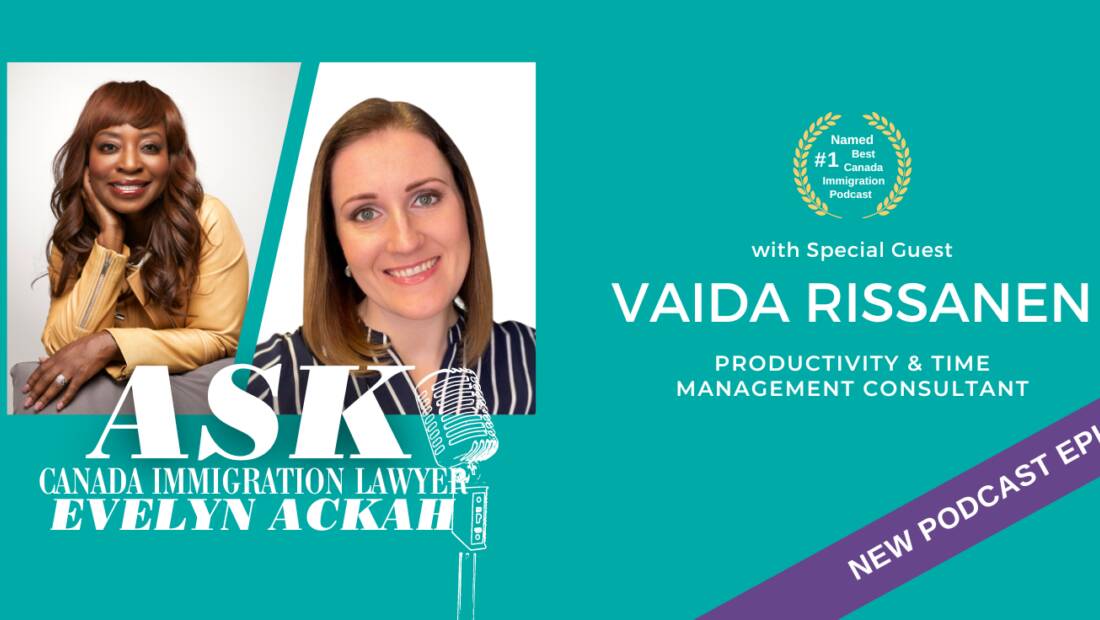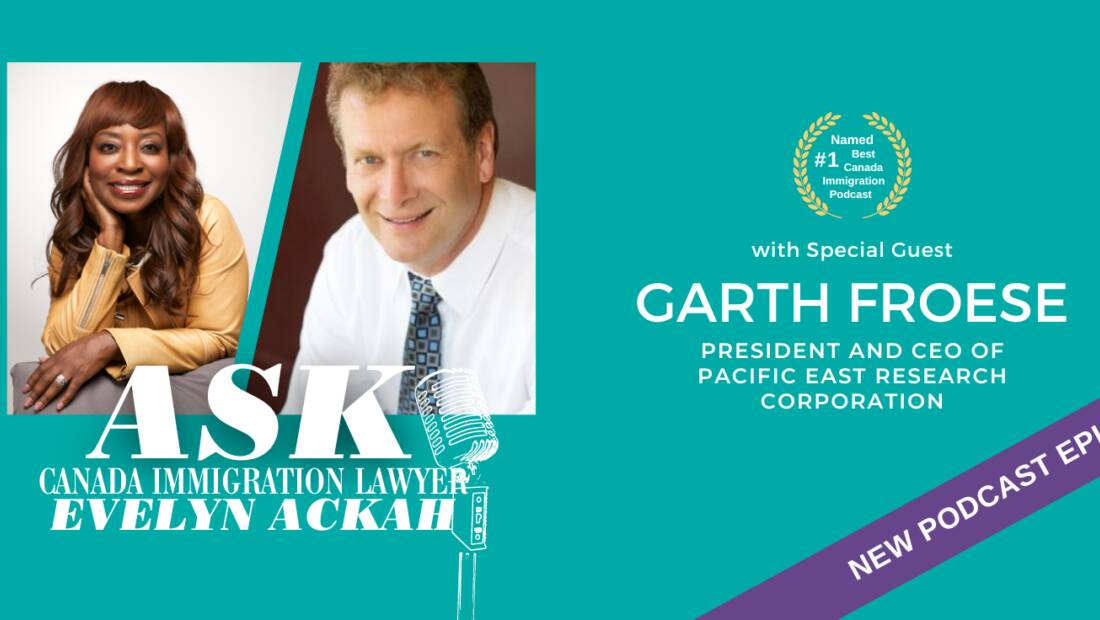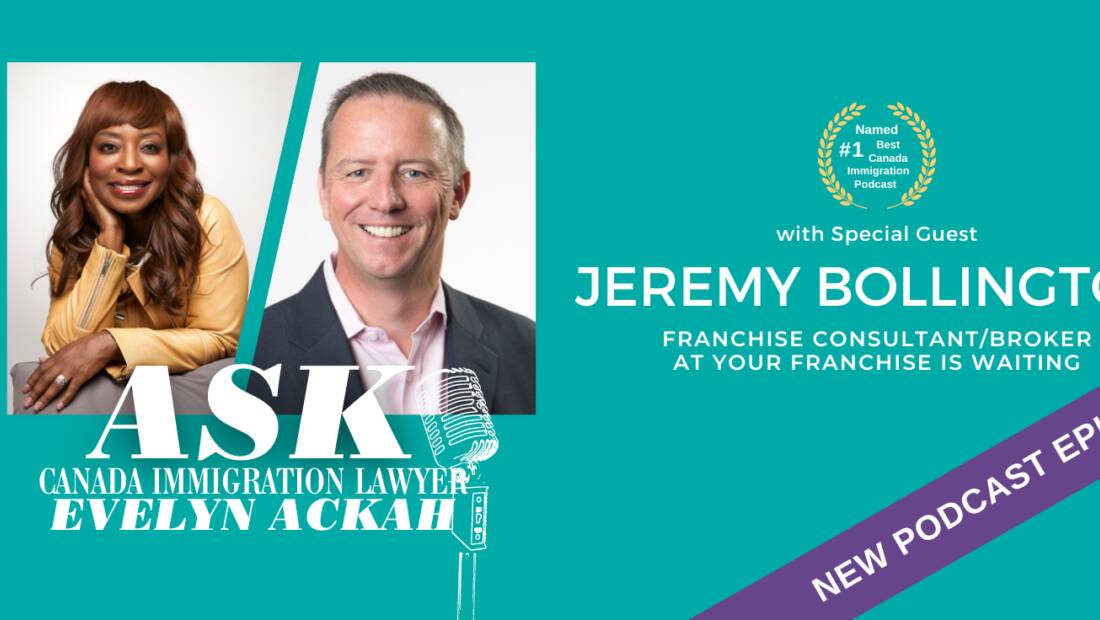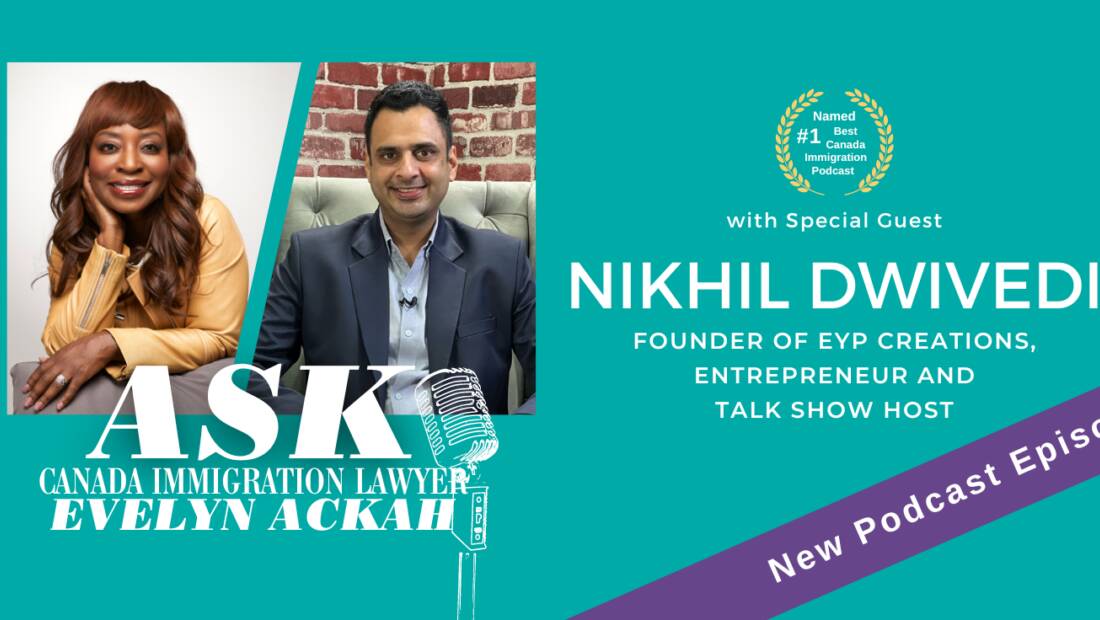Or listen on your favourite podcast app
On the Ask Canada Immigration Lawyer Evelyn Ackah podcast, Calgary immigration lawyer Evelyn Ackah interviews Jean-Philippe Couture, a business and tax lawyer who is passionate about technology and innovation. He is also the founder of Ingenio Solutions, a company that provides software for the corporate law practice. The software aims to automate and streamline corporate tasks, such as incorporation, annual maintenance, and dividend payments, while reducing errors and improving efficiency. Ingenio Solutions also offers services such as minute book storage and can act as a representative for companies in certain provinces. The software utilizes artificial intelligence to extract data from documents and improve accuracy.
Jean-Phillipe emphasizes the importance of innovation in the legal profession and welcomes inquiries from fellow innovators and clients. Connect with Jean-Philippe Couture on LinkedIn
BOOK YOUR FREE CASE EVALUATION
Evelyn Ackah and Jean-Philippe discuss the following immigration topics:
- The development of Ingenio Solutions and its focus on automating corporate law tasks.
- The increasing availability of corporate incorporations across Canada for non-residents and directors.
- The pros and cons of federal incorporation versus provincial incorporation.
- The upcoming launch of a federal transparency registry for corporations.
Jean-Philippe also
- provides insights into why a company might choose to incorporate federally, such as for the name protection and modern registry.
- notes that federal corporations need to extra-provincially register in the province where they are carrying on business.

About Evelyn Ackah
Evelyn Ackah is the Founder and Managing Lawyer at Ackah Business Immigration Law. With offices in Calgary, Toronto and Vancouver, we work with individuals and business owners from all over the world who want to cross borders seamlessly. For more information on immigration to Canada or the United States, Ask Evelyn Ackah at Ackah Business Immigration Law today at (403) 452‑9515 or email Evelyn directly at contact@ackahlaw.com.
The Ask Canada Immigration Lawyer Evelyn Ackah podcast by Calgary Immigration Lawyer Evelyn Ackah was named #1 Best Canada Immigration Podcast in 2023 by Feedspot.
BOOK YOUR FREE CASE EVALUATION
Transcript
Evelyn Ackah:
Good day, everyone. It's Evelyn Ackah from the Ask Canada Immigration Lawyer podcast. Thank you so much for joining us today. I have the pleasure of welcoming my friend and colleague, Jean-Philippe Couture. Hello, JP.
Jean-Philippe Couture:
Hi, how are you doing?
Evelyn Ackah:
Good. Thanks so much for joining us. I'm going to introduce you before we get chatting, but just wanted to let everybody know that Jean-Philippe is, we call him JP, he's a seasoned business and tax lawyer who is passionate about technology and innovation. He has also founded the company that we work with a lot at Ackah Law called Ingenio Solutions, where he combines his legal expertise with the drive for innovation.
JP regularly advises Canadian and international clients on corporate reorganizations, business structuring and more, and he has worked with clients from many, many industries, and he's also here based in Calgary with me, which is wonderful. So JP, welcome to the podcast.
Jean-Philippe Couture:
Thank you. Thank you for having me.
Evelyn Ackah:
Thank you. Thank you so much. So tell us a little bit about what you've been up to these days. You've got a lot of different things going on.
Jean-Philippe Couture:
Yeah. So, in addition to my regular practice, about four years ago we started building a software for the corporate law practice and we've been working at it. So it hasn't been a simple enterprise, but it's coming along quite well. And now we're essentially doing pilots using it for different things and doing some testing as well.
Evelyn Ackah:
Okay. So tell me about Ingenio because we know it on the Ackah Law team as the company we work with when we're doing our incorporations across the country for our clients related to intercompany transfers and things like that, but what else do you do? Or is that the main focus of Ingenio?
Jean-Philippe Couture:
Yeah, so if we go back a little bit, a few years before we started Ingenio, I was at a different firm. I was practicing law with PricewaterhouseCooper, the law firm PricewaterhouseCooper. And at the time, we were struggling a little bit with getting the work done internally and with staffing the files and things like that. But also, to have good quality work predictable and facilitate the lawyer's review for a simple corporate law task, like from incorporation, to annual maintenance, to the regular payment of dividends and things like that.
And then we were looking for different software. We were trying to figure a way to get the work done and automate the part where the staff didn't really like to do that work, so the simple, repetitive, prone to error. There was a flip side to it because it's prone to error, also, it was just taking a lot of our time to fix, a lot of time we didn't have on other files and everything.
So, we look at different solutions. We could find some solutions on the market that would allow us to blindly generate documents and things like that, but we couldn't find solutions that had actually legal intelligence built into them from the practice, the years of practice, but also from feedback from users and things like that. So, we started working on it and it wasn't a simple adventure to... I wasn't from a tech background. I was, at the time, I was on the Innovation Committee from the Canadian Bar Association, the Futures Committee for the profession.
I'm no mean an engineer or anything like that, so we recruited a team, we started building this. So, fast-forward four years, this is where we're at. We're getting ready to officially launch in early 2024. But in the meantime, we've been using the platform and testing it and doing all sorts of interesting things.
Evelyn Ackah:
Okay. So interesting. So I just want to get clear. So is it only focused on incorporations or is it bigger? It seems like it's bigger now.
Jean-Philippe Couture:
The full cycle, the full entity management, and even further down the road, we're already thinking about other functionality of that, but it's from, I would say, incorporation all the way to the solution of the company and everything in between.
Evelyn Ackah:
Wow. Wow.
Jean-Philippe Couture:
So, everything that happens in the life of a company. And like I said earlier, we're trying to build intelligence in it so that we reduce the number of errors, but also that we help lawyers benefit. Sometimes you have more junior lawyer that are doing some corporate task, and if we can build some experience and the knowledge over the years, acquire over the years, into the software. It's also structured along the line of a checklist. I think you and I have discussed that before. I'm a big fan of The Checklist Manifesto, so-
Evelyn Ackah:
Me too.
Jean-Philippe Couture:
... this is kind of, it was the early inspiration for the software or the structure of the software.
Evelyn Ackah:
Great.
Jean-Philippe Couture:
Exactly. So everything is organized is almost like a checklist to facilitate and make it user-friendly. The other thing we've focused onto is we've tried to break the barrier area between lawyers, paralegals and assistant, and also even further, the advisors of law firms or advisors of clients, I should say, like accountants or tax accountants, things like that. So really, we want the flow of information to be constant so that people know what's going on with the company at any given time.
Evelyn Ackah:
Oh my goodness. Okay. Well, I'm looking forward to seeing that. Just for full transparency, as I said, we work with you and your team and everyone has been fabulous to work with. And when we work with your team at Ingenio, it's usually to help us set up a company. And so in the old days, we were incorporating and there were not very many provinces where you could incorporate and not be a resident of Canada or not have a director.
And now, it seems like it's opening up and opening up across the country. So, BC was always our first choice first because they were a province that didn't require us to have a Canadian director. And sometimes I think it was PEI as well. So we'd have to be really creative as to where the company was going to be. But now, it's BC, Alberta, I think it's now almost across the country. Isn't that right?
Jean-Philippe Couture:
Yeah. So several jurisdictions, there's still some jurisdictions that have a 25% requirement of having Canadian resident directors. But I think several jurisdictions. Traditionally, Canadian corporate law was, I would say, probably in 70% of the provinces it was very similar. But increasingly, we're seeing some province, like in the last 18 months Alberta has passed some legislation to change that director's residency test.
But also, it brought in a lot of other things that are quite interesting in the world of private equity, for example, that they brought these provision to modernize the Alberta Business Corporation Act and just make it more accessible for private equity to invest through Canada, through Alberta and Canada. So, Quebec did the same thing a few years back, I believe it was in 2011. They completely redid their statute, but follow more, I would say, the model from Delaware in the US. The recent amendment from Alberta are probably directly inspired from Delaware as well, so we're seeing a lot of movement there.
So traditionally, where we had two or three province who were very different than the rest of the country, now we're starting to see more differences between the different provinces. So, BC is one, BC as you mentioned, has always been a traditional jurisdiction. We're seeing increasingly Alberta for non-residents who come and incorporate. Ontario has been struggling a little bit with a rollout of their corporate registry, but that's another jurisdiction that probably we will see some changes in the near future.
And the Quebec one, the Quebec comes with other restrictions that other province don't have. For example, in terms of language, having a French name in addition to the English name. The Federal Corporation also is launching a transparency registry in the coming months. We used to have a register in the minute books about the ownership, who's behind the company? Who are the people with significant interest? What we're seeing with the federal company now is they're coming also with an actual register where you're going to have to go and enter that and it will be publicly searchable and available. So that comes with all kinds of challenge as well.
Evelyn Ackah:
Yeah, for sure. Okay, that's good to know. Tell me, JP, why would a company coming into Canada do federal incorporation? What would be the reason versus doing a provincial registration and maybe extra provincial to another province? What would be that requirement or that need or interest? Because sometimes our clients ask us that.
Jean-Philippe Couture:
Yeah. Federal Corporation in Canada, the nice thing is you got name protection across the country, so that's a big one. They have a modern registry that easy to manage. The fee are amongst the lowest, like animal maintenance for example, is a quarter of what the cost is for Alberta. And similar to what it is, a quarter of what it is in BC and Ontario as well. So, it's very accessible, very modern registry.
The downside is that you don't have a lot of information on the corporate registry, the federal corporate registry, it's limited. Now, in Ontario, Federal Corporation were quite popular in recent years 'cause Ontario was kind of in a difficult rollout of its registry, so a lot of lawyers and a lot of people were incorporated federally instead of Ontario.
The downside of federal companies, you need to extra-provincially register. So if you're a US company, for example, a Delaware company operating Canada, you need to extra-provincially register in the province where you're carrying on business. If you're a federal corporation, it's the same thing. So you've got to extra-provincially register. So that often adds to the cost.
Evelyn Ackah:
The cost.
Jean-Philippe Couture:
So, if we think about incorporating an Alberta company, the disbursements are approximately $275. If you incorporate a federal company, it's 200, but then you've got to pay another 275 on tops. So you're more than doubled just because of the cost there.
So, there's these distinctions there, but most people really like the Federal Registry because it was more modern in a world where most provinces, the registries are not very modern, it's not very easy to file annual returns and do your compliance.
Evelyn Ackah:
So tell me what you mean by modern. Is it the technology usability?
Jean-Philippe Couture:
It's accessible online. It's accessible, you don't need to be certified. For example, in Alberta to file with a corporate registry, you need to be a certified with the corporate registry and register with corps. In federal registry, you don't need to do this. You create a user profile and then you can get started immediately. You don't need to be a lawyer, you don't need to be a paralegal, you have no such requirements.
So, that was, I think, one of the advantage. I think they're continuing to innovate, but I think they've sort of left their foot off the gas a little bit in the last two or three years. Sadly, because I think the world of corporation in Canada is pretty archaic. If you look at all the registry, the technology that is deployed to help businesses manage their operations, it's not super modern, but federal companies we're doing really well. Now, we're seeing a little bit of a slowing on the pace of innovation there.
Evelyn Ackah:
Okay. Okay. Well, it'll be interesting to see how this unfolds. After the incorporation part of Ingenio, like say for our clients, could you be the address? Are you the agent? Do you do the whole thing? [inaudible 00:12:35].
Jean-Philippe Couture:
Yeah, so depending [inaudible 00:12:37] what province. So for example, in Alberta, we offer that service. If we have an office or if we have a location elsewhere, like we're looking at this right now, but we can offer that service in other provinces as well. So, that's one thing.
The other thing to keep in mind too, is the turnaround time, and you and I have talked about this before. So Federal Corporation, Alberta Corporation, Ontario Corporation, they all have, you need to do a name search. If it's a name company, you need to do a name search. And it's usually instant. So you know right away whether you have similar or comparable businesses with a similar name.
What the problem is very often is with British Columbia is it's the time, the turnaround time. So if you do at a name search in British Columbia, it's $30. So it's not super expensive, but the last I was looking at it, I think now they're at 44 open business days if you do just the regular name search to give you an answer.
Evelyn Ackah:
My God.
Jean-Philippe Couture:
If you do an accelerated one, which now goes from 30 to $130, they do it usually within three days, so you get a response. Where if you incorporate federally, Ontario or Alberta, you can do a name search, and right away we will tell you, "Yeah, it's available or not available." And also, once it's approved, then we can file.
Sometimes for federal company, there's an examiner that looks at the name just to make sure before they finally approve. Some other jurisdiction, there's none, but there could be a little bit of a delay there but it's never more than 24 or 48 hours for these companies. So, somebody is in a rush. And I would say if you want to incorporate a company very quickly, I'd say Alberta is a very good jurisdiction, very safe jurisdiction right now.
Evelyn Ackah:
Yep, for sure. I'm definitely encouraging everybody to come to Alberta, there's no way... 'Cause it's expensive in BC if you want to live as well and operate your business and taxes are different and all of that, but sometimes they still want the BC incorporation. And so what we've come up with your help and your team is just the checklist we've had to explain to clients to understand that you can't just choose A, B, C corp. It's got to be descriptive. It's got to make it clear what they're doing and what the business is so it doesn't get confused with others.
And so it's very different from some of the companies you work with because they don't have those requirements in India or China, you know what I mean? And so we've had to really educate the client to understand why we're asking for three or four different name options to save time, to save your time and our time.
But so far, it's been a wonderful partnership. I've really appreciated the expertise. Our clients think it's great. We get this electronic minute book, it looks fabulous, it's branded. And so knowing now that you could be the representative in Alberta is something else that maybe we'll share with our clients. You don't have a BC address yet that you would use at this time?
Jean-Philippe Couture:
No, not yet, but that's in the work right now.
Evelyn Ackah:
Okay, that would be great. So where do you see Ingenio going? It's been four years and now you're launching next year. What could it be?
Jean-Philippe Couture:
Yeah, so one of the things we're looking at is not just to sell a software, to go a little bit deeper into the service that we're offering, automating more of the services. We're looking at all the service. If you look in a traditional law firm that the work that is done by paralegal or lawyers that people don't like or things that get missed on the compliance side.
So, we're looking at all these things and say, "Okay, is it an opportunity for us to add value with modern technology?" An example, a company pays dividend, but very often the communication between the lawyer is not always there between the lawyer and the accountants. Is there a way where we can send a notification to the accountant saying, "All these dividends were paid this year, you got some tax filings to do."
Because these things, when you look at it, very often they are forgotten, but they result in penalties for clients. And then it's always hard on the relationship between the accountant, the lawyer, and the clients to say, "Okay, who's going to pay the penalty now?" Sometimes it's just smaller penalty, but there are other situation, for example, where penalties are seven or $8,000 for the emission. So we're trying to create an environment where we miss less and less of these filings and it doesn't require a lot of people to keep track of it. So, we're really focusing on that and making the information more available to the clients.
Evelyn Ackah:
Okay. And so when you do minute book storage, it used to be you needed all this space. So now that you're using it and you're doing it all electronically, certainly you don't need the level of space, you don't need the storage, you don't need... So it's all online, everything is electric, [inaudible 00:17:39]?
Jean-Philippe Couture:
All online. Yep.
Evelyn Ackah:
Okay.
Jean-Philippe Couture:
All online, and then it gets automatically updated, so that's the beauty of our software. So every time you do a new transaction and you complete that transaction, the minute books get automatically updated. Clients can download if they want. They can download the minute book at any time. So if you do a transaction today and tomorrow they need to go see the bank for something, they can just log in, download the minute books, the most recent version of the minute books and go to the bank. And then that's simple as that.
Because in the past, back in my old days, what we would do is we would do all this work, but very often you've done the work, you've built a client, and very often the updating of the minute book is you put it aside, you wait until when things are a bit slow, but things never really get slow.
Evelyn Ackah:
They never get slow.
Jean-Philippe Couture:
They may never get updated, things get forgotten or get missed. And then what typically happen, is you have an audit from the tax authority or something, and then there is a bit of a frenzy in the few days before the audit to get everything into the minute book that was signed before. So people are digging through their files trying to find resolutions and documents and updating. And so we're trying really to create a bit of a good habit of having everything in a centralized place.
Evelyn Ackah:
Okay. So does Ingenio connect and work with your legal practice? So for instance, if we have a client that works with Ingenio incorporates and they need tax support corporate, you would do all that from a legal services as well, so there's adjudication?
Jean-Philippe Couture:
Yeah, we can help with the receivers. Yeah. It's two separate entities for regulatory reasons, but we work closely for the legal services and everything. The way we're using our practice, we're using it to test the software. So our goal is not to send software to law firms until it's been tested and then it works well. And then we've, excuse the expression, but we flush all the bugs. In the world of technical software like software for law, very often you get a subscription, but then you're just like, "Oh, there's all these bugs or this thing," or you constantly try to find workarounds. So the nice thing with this, is we're doing tests like live tests.
Evelyn Ackah:
Yeah, on your own practice.
Jean-Philippe Couture:
[inaudible 00:19:53] software on our own practice. So yeah, we know exactly. So, we try to fix all the bugs. And there will always be little things, but we try to fix everything that is major before clients start using it.
Evelyn Ackah:
How has AI impacted this whole process? ChatGPT's everywhere. Is there any artificial intelligence components of your programming?
Jean-Philippe Couture:
Yeah, so for us, it's essentially building the record. So when we started this project, we looked around and said, "Okay, how do we get the data into our system?" If you have an existing company that's been around for 10 years, how do you get everything inside the software? So, we were trying to look and some software solutions out there, they do a transfer of data from another software that the clients were using. But over the years, we realized that the data was very, there's a lot of errors or emissions and things missing. So, our concern was garbage in, garbage out. So if you get all this bad data into your software, so we've really built around getting better, more accurate data.
So we use AI more in the capacity to, how do we extract data out of documents to say, for example, "This form, we need all this information that is in this corporate form?" So, clients scan the documents, our system goes in and capture data points. We still, and we will have for a while, people still reviewing it, but they don't have to do the manual part of it. So we're really trying to automate as much as possible into this. And the hope is that in a few years from now, we're all be going to be working from electronic record that is more and more accurate.
Evelyn Ackah:
Yeah, that's great.
Jean-Philippe Couture:
We're trying, one other thing we're trying to do is to, what used to be in a binder and not very useful for clients, we think we can put it in a digital world and turn it into something that is useful for clients and clients see value in what the information that is in there because the information is accurate, and it's done on time, and it's not a burden for anyone.
Evelyn Ackah:
And it's not a burden. I love it. I love talking to lawyers who recognize that technology is a value add. Technology makes us better lawyers. We need to embrace it as, opposed to, "Oh, I don't want to go into that cloud-based world or using technology in a way that's going to..." It's not going to replace lawyers ever, but it allows us to focus on quality work and the real thinking and analysis and things that, that people-to-people connection.
So, I just feel it's fabulous that you've embraced it, and I'm excited to see how it grows and develops, and we're really grateful for the opportunity to continue working with Ingenio. So I wanted just to say, is there anything else you want to share, JP, about your practice, about Ingenio, how people can find you?
Jean-Philippe Couture:
Yeah. So, we're in the process of launching a brand new website, but they can email me directly, jcouture@ingenio.ca. And if it's just other fellow innovator or clients who have questions, always happy to take the time to sit down with people and talk about innovation. Like you said, I think you're absolutely right, as lawyers, as a profession, innovation is a collective responsibility. We need to all do this. We need more innovator like you, and we all need to work towards that. I think in the end, it's the clients that get the benefit from it.
Evelyn Ackah:
Absolutely. I agree. This is certainly going to benefit a lot of clients. So, I want to thank you so much for joining me on my podcast, JP, it's been a pleasure, and continued success with Ingenio and your practice. Take care.
Jean-Philippe Couture:
Thank you so much. Have a good day.
Evelyn Ackah:
Thank you. Thank you so much.

